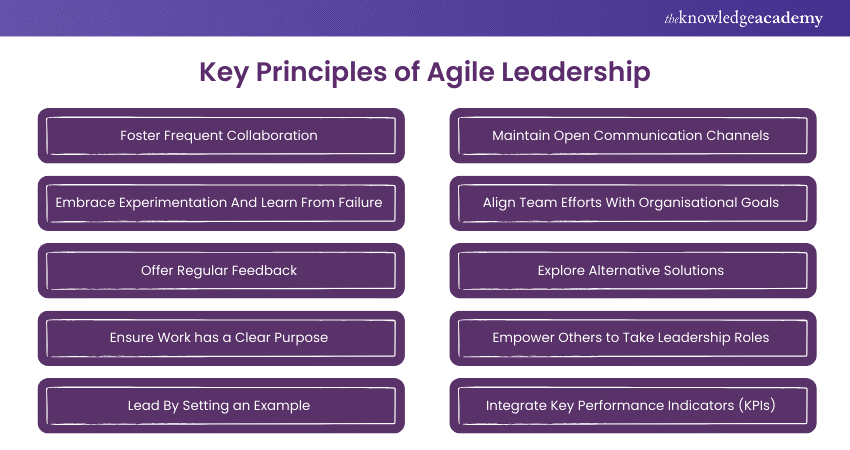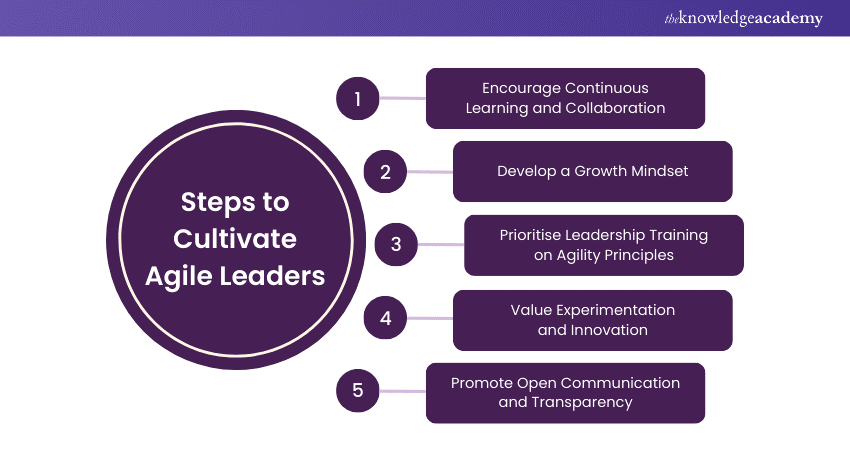We may not have the course you’re looking for. If you enquire or give us a call on +64 98874342 and speak to our training experts, we may still be able to help with your training requirements.
Training Outcomes Within Your Budget!
We ensure quality, budget-alignment, and timely delivery by our expert instructors.

Is your leadership style ready to face the hardships and challenges of today’s fast-paced world? If not, then you need to think again! Wondering why? Well, the answer lies in the evolution of Agile Leadership methodology. Agile Leadership has gained significant traction in the modern work culture owing to the rapidly dynamic industrial ecosystem. A recent survey found that 68% of respondents who follow the agile transformation model felt empowered by their leaders. Likewise, there are many such examples. Continue reading this blog to discover Agile Leadership's importance, benefits, key principles, and more. Let's begin our career-empowering journey!
Table of Contents
1) What is Agile Leadership
2) Importance of Agile Leadership
3) Benefits of Agile Leadership in Business
4) Key Principles of Agile Leadership
5) Steps to Cultivate Agile Leaders
6) Conclusion
What is Agile Leadership?
Agile Leadership is a popular approach to management practice where the leaders implement dynamic strategies that are flexible and adaptable to the ongoing market and technological demands.
To understand it in a better way, let's take an example. Suppose you are the CEO of the company that is developing a new app. But suddenly you saw that user demands shift. So, you instruct your team members to implement a newer methodology which is inclined toward the users' demands. This way, you can adapt both to market changes and enhance your brand reputation in the corporate industry.
Importance of Agile Leadership
Agile leadership is essential in today's ever-changing business environment, where adaptability is key. Agile leaders excel at navigating rapid changes and technological advancements, promoting flexible strategies that allow teams to pivot quickly in response to new challenges. By empowering their teams, these leaders foster a culture of accountability and creativity, enabling individuals to take ownership of their work and make decisions that drive success.
Furthermore, agile leadership enhances collaboration and communication within teams, ensuring everyone is aligned with the organisation's goals. This open dialogue leads to faster problem-solving and innovative solutions, ultimately prioritising customer needs.
By embracing continuous improvement, agile leaders encourage reflection on successes and failures, driving ongoing growth and evolution in processes and offerings. In this way, agile leadership cultivates a responsive, innovative, and customer-centric organisational culture.
Transform your tech leadership today with our Leadership Skills Training- register today!
Benefits of Agile Leadership in Business
Agile Leadership brings numerous benefits to businesses by promoting a sense of adaptability, collaboration, and innovation. Here are some of its vital benefits listed below:
1) Promoting Adaptability:
Agile Leadership helps in promoting an adaptable, collaborative, and innovative culture. It enables quick responses to dynamic market changes and internal challenges within the organisation to ensures optimum competitiveness and relevance.
2) Encouraging Experimentation:
By empowering teams and promoting experimentation, Agile Leadership creates an environment where employees feel valued and motivated about their working abilities. This leads to enhanced productivity and morale.
3) Prioritising Transparent Communication:
By prioritising transparent communication and continuous feedback, Agile Leadership helps leaders to identify and resolve issues quickly, which helps in minimising risks and enhancing overall efficiency.
4) Decentralised Decision-Making:
Agile businesses benefit from decentralised decision-making, which allows teams to act quickly and autonomously. This is crucial for staying ahead in a rapidly evolving market landscape.
5) Supporting Productive Growth:
Agile Leadership supports productive growth by creating a robust organisational culture where changes are valued. This aspect is vital for handling uncertainties and upholding newer opportunities.
Key Principles of Agile Leadership
Agile Leadership relies on several fundamental principles. These principles empower businesses to implement this leadership approach through the right tactics and strategies for maximised results. Here are those listed principles described below:

1) Foster Frequent Collaboration
Agile Leadership encourages regular teamwork between departments to ensure that everyone is aligned and adaptable to the same set of changes.
2) Embrace Experimentation And Learn From Failure
It promotes an innovative culture where newer ideas are valued and practised to upscale learning and advancements.
3) Offer Regular Feedback
It provides regular feedback to help team members grow and improve throughout their projects.
4) Ensure Work Has a Clear Purpose
It helps align business tasks toward broader organisational goals, providing employees with a sense of motivation and direction.
5) Lead By Setting an Example
Demonstrate agile principles in your behaviours, showing flexibility and willingness to adapt.
6) Maintain Open Communication Channels
It keeps communication open and accessible across all departments to ensure every feedback is heard.
7) Align Team Efforts With Organisational Goals
Agile Leadership ensures that the team's work always aligns with the company’s objectives.
8) Explore Alternative Solutions
It encourages multiple solutions to problems to ensure the company has enough backup in case of emergency.
9) Empower Others to Take Leadership Roles
It enables a culture where every team member feels like a leader through handling various initiatives in order to create a dynamic work culture.
10) Integrate Key Performance Indicators (KPIs)
The agile leaders optimise various KPIs to track the level of progress and success, helping teams to stay focused and informed about their impact.
Engineer high-performance team dynamics – sign up for our High Performing Teams Training!
Steps to Cultivate Agile Leaders
There are several ways how you can cultivate agile leaders in your organisation. Below, we have listed a few of those steps:

1) Encourage Continuous Learning and Collaboration:
Cultivating agile leaders helps create an environment where continuous learning, adaptability, and collaboration are promoted. This means that to provide resources and opportunities for ongoing education and skill development. Moreover, it helps to encourage leaders to stay current with industry trends and best practices.
2) Develop a Growth Mindset:
It provides opportunities for leaders to cultivate a growth mindset, valuable feedback, and learn from both successes and failures. This helps them become more resilient and better equipped to absorb change.
3) Prioritise Leadership Training on Agility Principles:
It focuses on leadership training that emphasises agility principles, such as fostering collaboration and encouraging teams. This includes workshops, seminars, and mentorship programs that teach leaders on how to create and sustain agile practices in a better way.
4) Value Experimentation and Innovation:
It helps create a culture where experimentation and innovations approaches are valued, encouraging leaders to explore better approaches and make data-driven decisions. This approach not only enhances problem-solving skills but also fosters a sense of ownership and accountability among team members, driving continuous improvement and creativity.
5) Promote Open Communication and Transparency:
The Agile Leadership approach promotes open communication and transparency to create a safe space for teams where they can share ideas and take calculated risks. When leaders model these behaviours, they build trust and encourage a collaborative atmosphere.
Reshape ethical standards in technology- secure your seats for Ethical Leadership Training!
Conclusion
We hope you understand what Agile Leadership is and the related insights. Agile Leadership is a transformative approach that helps organisations to stay competitive, robust, and relevant in dynamic corporate environments. Understanding the key importance, benefits, and principles of Agile Leadership equips organisations with the tools to achieve productivity growth and success in a rapidly evolving world.
Optimise tech leadership with our advanced Executive Leadership Coaching Training- register now!
Frequently Asked Questions

The three Cs of Agile Leadership are communication, collaboration, and commitment. These Cs aim to emphasise clear communication to align common goals, collaborative teamwork, and commitment to continuous improvement.

The three pillars of agile are transparency, inspection, and adaptation. These principles ensure that teams are working openly, regularly reviewing progress, and adjusting strategies as needed.

The Knowledge Academy takes global learning to new heights, offering over 30,000 online courses across 490+ locations in 220 countries. This expansive reach ensures accessibility and convenience for learners worldwide.
Alongside our diverse Online Course Catalogue, encompassing 19 major categories, we go the extra mile by providing a plethora of free educational Online Resources like News updates, Blogs, videos, webinars, and interview questions. Tailoring learning experiences further, professionals can maximise value with customisable Course Bundles of TKA.

The Knowledge Academy’s Knowledge Pass, a prepaid voucher, adds another layer of flexibility, allowing course bookings over a 12-month period. Join us on a journey where education knows no bounds.

The Knowledge Academy offers various Leadership Courses, including Agile Leadership Training, High Performing Teams Training, and Executive Leadership Coaching Training. These courses cater to different skill levels, providing comprehensive insights into Delegation Skills for Effective Leadership.
Our Business Skills Blogs cover a range of topics related to effective leadership, communication, project management, and professional development, offering valuable resources, best practices, and industry insights. Whether you are a beginner or looking to advance your business skills, The Knowledge Academy's diverse courses and informative blogs have got you covered.
Upcoming Batches & Dates
Date








 Top Rated Course
Top Rated Course



 If you wish to make any changes to your course, please
If you wish to make any changes to your course, please


